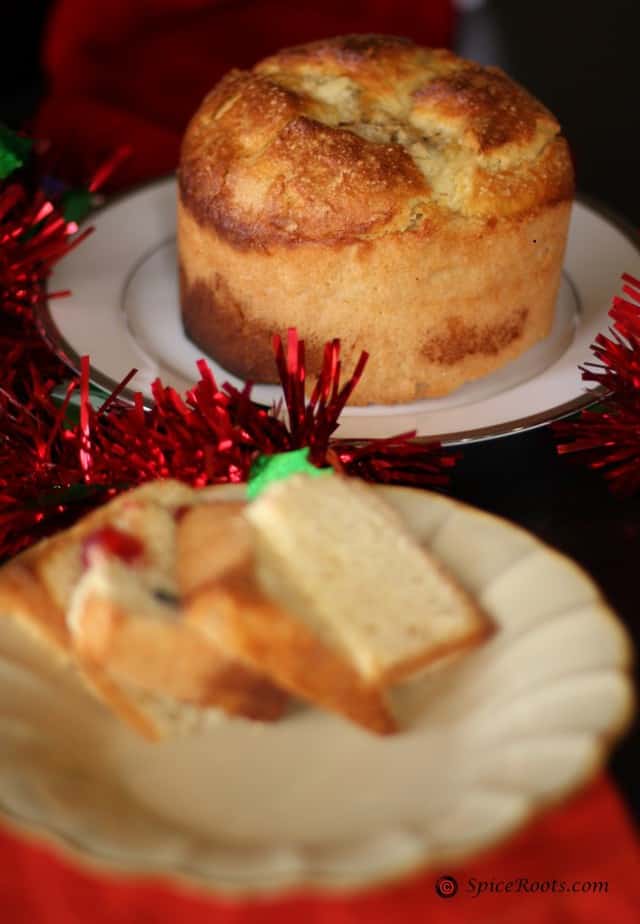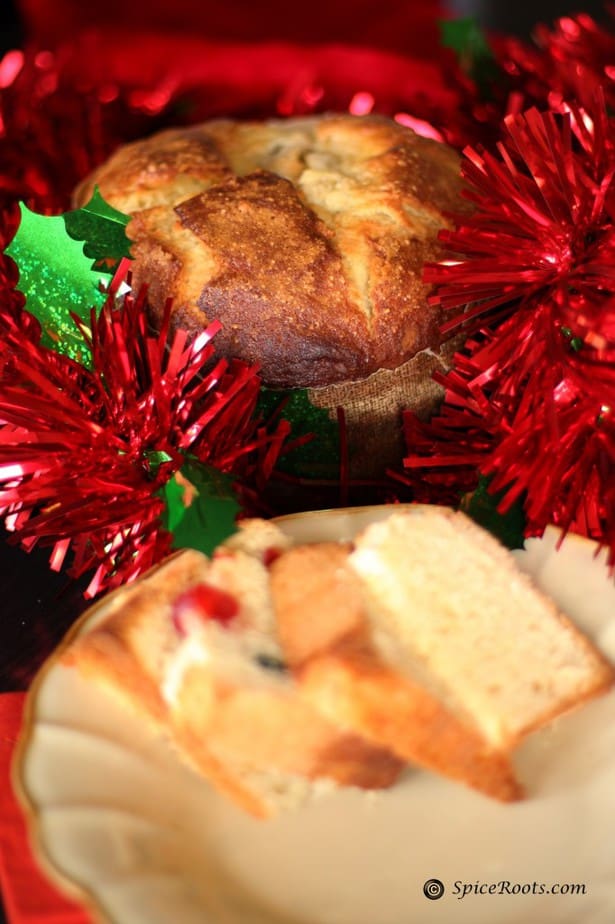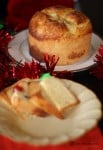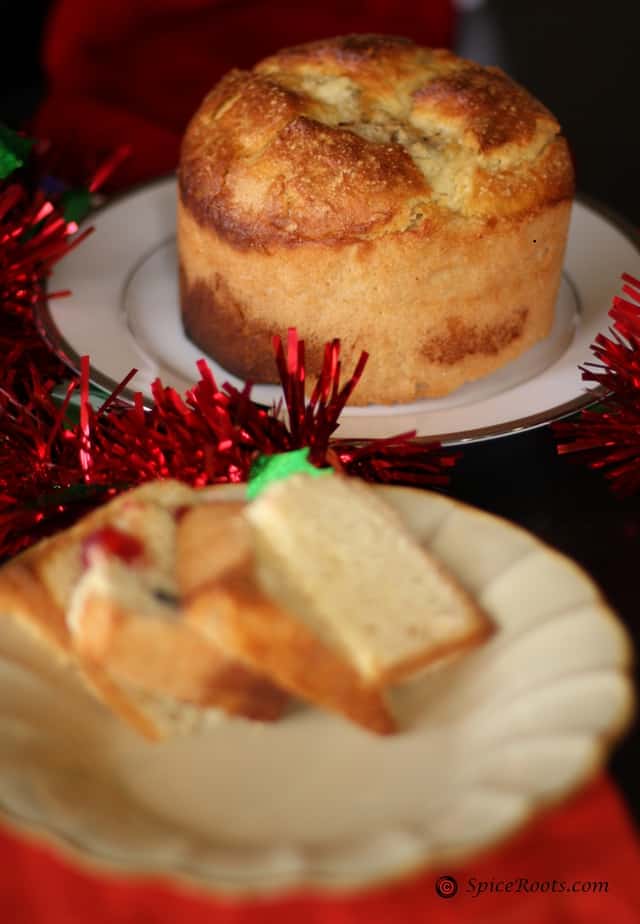
Light in texture, filled with fragrant citron peels, lemons, candied fruits and spectacular to look at – The Traditional Panettone. The much loved sweet bread enjoyed on Christmas and New years in Italy, Southeastern France, Brazil, Peru, Malta, Germany and Switzerland.
There are many legends about the origins of the bread. One of them says that Panettone was born at the Sforza times, in Lombardy, Northern Italy, when an absentminded cook burnt the dessert he was preparing for a Court dinner on Christmas Eve. One of the kitchen helpers, whose name was Toni, made use of the leftover bread dough and added eggs, raisins, candied fruits, butter and sugar. When the resulting sweet bread was served, it was a great success and since then it was called “Pan (bread) de Toni (of Toni)”.
There are some more interesting stories associated with the bread. I, for one, am just glad that I got to make a beautiful bread, that has so much history associated with it. This was my very first Daring Baker’s challenge that I took part in. My friend Finla, who writes the beautiful blog : – My Kitchen Treasures and another friend pushed me on and said they believed in me, even when I did not believe that I could do Daring Baker’s challenges. It’s friend’s like these that I am ever thankful for.
The process of baking a Panettone looked daunting at first (when you are looking at the recipe, sitting in Denver, you tell yourself you are mad for even thinking of trying this at high altitude). Then the baker in me woke up and said, “At the worst we are going to get an end product that may just fall onto itself but still taste good with the butter, candied fruits and almond glaze. So put the apron on and get the flour out.”
And I did. And am glad that I did.
The December 2012 Daring Bakers’ challenge was hosted by the talented Marcellina of Marcellina in Cucina. Marcellina challenged us to create our own custom Panettone, a traditional Italian holiday bread!


Traditional Panetonne
Ingredients
Sponge
- 7 gm active dry yeast
- 1/3 cup 80 ml warm water
- ½ cup 70 gm unbleached all purpose flour
First Dough
- 1 satchel 7 gm active dry yeast
- 3 tablespoons 45 ml warm water
- 2 large eggs at room temp
- 1¼ cup 175 gm unbleached all-purpose flour
- ¼ cup sugar
- 115 gm unsalted butter at room temp
Second dough
- 2 large eggs
- 3 large egg yolks
- 150 gm sugar
- 3 tablespoons honey
- 1 tablespoon vanilla extract
- 1 teaspoon lemon essence/extract
- 1 teaspoon orange essence/extract
- 1 teaspoon salt
- 2 sticks 225 g unsalted butter, at room temp
- 3 cups 420 gm (15 oz) unbleached all-purpose (plain) flour; plus up to (2/3 cup) 100 gm for kneading
- Filling and final dough
- 1½ cups 250 gm (9 oz) golden raisins
- ½ cup 75 gm (2-2/3 oz) mixed candied fruit (
- Grated zest of 1 orange
- Grated zest of 1 lemon
- 2 to 3 tablespoons 30-45 ml (15-25 gm) unbleached all-purpose (plain) flour
- Instructions
Instructions
Sponge
Mix the yeast and water in a small bowl and allow to stand until creamy. That’s about 10 minutes or so
Mix in the flour
- Cover with plastic wrap and allow to double in size for about 20 to 30 minutes
First Dough
In the mixer bowl, mix together the yeast and water and allow to stand until creamy. Again, about 10 minutes or so
With the paddle attached mix in the sponge, eggs, flour, and sugar
Add in the butter and mix for 3 minutes until the dough is smooth and even
First Rise
- Cover with plastic wrap and allow double in size, about 1 – 1 ¼ hours
Second Dough
With the paddle mix in thoroughly the eggs, egg yolks, sugar, honey, scraped vanilla bean, essences/extracts, and salt
Mix in the butter until smooth
Add the flour and slowly incorporate
At this stage the dough will seem a little too soft, like cookie dough
Replace the paddle with the dough hook and knead for about 2 minutes
- Turn out the dough and knead it on a well-floured surface until it sort of holds its shape. { i used just a bit of flour on my hands }
Don’t knead in too much flour but you may need as much as 2/3 cup. Be careful the excess flour will affect the finished product
Second Rise
Oil a large bowl lightly, plop in your dough and cover with plastic wrap. Let it rise in a warm place for 2 hours then put it overnight in a cool spot like the fridge. Next day take it out and let it wake up and rise to at least 3 times its original size
Filling and Final Rise
- Soak the raisin in water 30 minutes before the end of the first rise. {I used raisins without soaking}
Drain and pat dry with paper towels
Now take your dough and cut it in half. Remember we are making two panettoni
Combine all your filling ingredients and mix well
Press out one portion of dough into an oval shape
- Sprinkle over one quarter of the filling and roll up the dough into a log
Press out again into an oval shape and sprinkle over another quarter of the filling
Roll into a log shape again
Repeat with the second portion of dough
Shape each into a ball and slip into your prepared pans, panettone papers or homemade panettone papers
Cut an X into the top of each panettone and allow to double in size. If it has been rising on the kitchen bench in a warm place it should be doubled in about 2 hours
Baking
When you think your dough has only about 30 minutes left to rise preheat your oven to moderately hot 400º F
Just before baking carefully {don’t deflate it!} cut the X into the dough again and place in a knob {a nut} of butter
- Place your panettoni in the oven and bake for 10 minutes
- Reduce the heat to moderate 350*F and bake for another 10 minutes
Reduce the heat again to moderate 325°F and bake for 30 minutes until the tops are well browned and a skewer inserted into the panettone comes out clean
Cool the panettone by laying them on their side cushioned with rolled up towels. Turn gently as they cool
Recipe Notes
The slow rise of the dough makes a great tasting panettone. My panettone molds were bigger and the dough did not really rise well beyond the rim. But I loved the delicious flavors of this bread-cake even better after a day or two.

